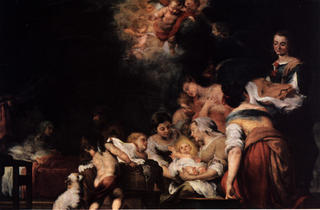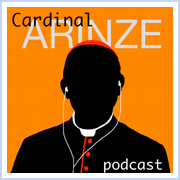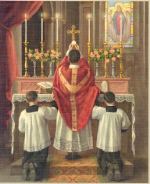From: Matthew 1:1-16, 18-23 The Ancestry of Jesus Christ
The Ancestry of Jesus Christ[1] The book of the genealogy of Jesus Christ, the Son of David, the son of Abraham.[2] Abraham was the father of Isaac, and Isaac the father of Jacob, and Jacob the father of Judah and his brothers, [3] and Judah the father of Perez and Zerah by Tamar, and Perez the father of Hezron, and Hezron the father of Ram, [4] and Ram the father of Amminadab, and Amminadab the father of Nahson, and Nahson the father of Salmon, [5] and Salmon the father of Boaz by Rahab, and Boaz due father of Obed by Ruth, and Obed the father of Jesse, [6] and Jesse the father of David the king. And David was the father of Solomon by the wife of Uriah, [7] and Solomon the father of Rehoboam, and Rehoboam the father of Abijah, and Abijah the father of Asa, [8] and Asa the father of Jehoshaphat, and Jehoshaphat the father of Joram, and Joram the father of Uzziah, [9] and Uzziah the father of Jotham, and Jotham the father of Ahaz, and Ahaz the father of Hezekiah, [10] and Hezekiah the father of Manasseh, and Manasseh the father of Amos, and Amos the father of Josiah, [11] and Josiah the father of Jechoniah and his brothers, at the time of the deportation to Babylon.
[12] And after the deportation to Babylon: Jechoniah was the father of Shealtiel, and Shealtiel the father of Zerubbabel, [13] and Zerubbabel the father of Abiud, and Abiud the father of Eliakim, and Eliakim the father of Azor, [14] and Azor the father of Zadok, and Zadok the father of Aching and Achim the father of Eliud, [15] and Eliud the father of Eleazar, and Eleazar the father of Matthan, and Matthan the father of Jacob, [16] and Jacob the father of Joseph the husband of Mary, of whom Jesus was born, who is called Christ.
The Virginal Conception of Jesus, and His Birth[18] Now the birth of Jesus Christ took place in this way. When His mother Mary had been betrothed to Joseph, before they came together she was found to be with child of the Holy Spirit; [19] and her husband Joseph, being a just man and unwilling to put her to shame, resolved to send her away quietly. [20] But as he considered this, behold, an angel of the Lord appeared to him in a dream, saying, "Joseph, son of David, do not fear to take Mary your wife, for that which is conceived in her is of the Holy Spirit; [21] she will bear a son, and you shall call His name Jesus, for He will save His people from their sins." [22] All this took place to fulfill what the Lord had spoken by the prophet: [23] "Behold, a virgin shall conceive and bear a son and His name shall be called Emmanuel" (which means God with us).
___________________________
Commentary:1. This verse is a kind of title to St Matthew's entire Gospel. The promises God made to Abraham for the salvation of mankind (Gen 12:3) are fulfilled in Jesus Christ, as is Nathan's prophecy to King David of an everlasting kingdom (2 Sam 7:12-16).
The genealogy presented here by St Matthew shows Jesus' human ancestry and also indicates that salvation history has reached its climax with the birth of the Son of God through the working of the Holy Spirit. Jesus Christ, true God and true man, is the expected Messiah.
The genealogy is presented in a framework of three series, each consisting of fourteen links which show the progressive development of salvation history.
For the Jews (and for other Eastern peoples of nomadic origin) genealogical trees were of great importance because a person's identity was especially linked to family and tribe, with place of birth taking secondary importance. In the case of the Jewish people there was the added religious significance of belonging by blood to the chosen people.
In Christ's time each family still kept a careful record of its genealogical tree, since because of it people acquired rights and duties.
6. Four women are named in these genealogies--Tamar (cf. Gen 38; 1 Chron 2:4), Rahab (cf. Josh 2:6,17), Bathsheba (cf. 2 Sam 11:12, 24) and Ruth (cf. Book of Ruth). These four foreign women, who in one way or another are brought into the history of Israel, are one sign among many others of God's design to save all men.
By mentioning sinful people, God's ways are shown to be different from man's. God will sometimes carry out his plan of salvation by means of people whose conduct has not been just. God saves us, sanctifies us and chooses us to do good despite our sins and infidelities--and he chose to leave evidence of this at various stages in the history of our salvation.
11. The deportation to Babylon, described in 2 Kings 24-25, fulfilled the prophets' warning to the people of Israel and their kings that they would be punished for their infidelity to the commandments of the Law of God, especially the first commandment.
16. Jewish genealogies followed the male line. Joseph, being Mary's husband, was the legal father of Jesus. The legal father is on a par with the real father as regards rights and duties. This fact provides a sound basis for recognizing St Joseph as Patron of the whole Church, since he was chosen to play a very special role in God's plan for our salvation; with St Joseph as his legal father, Jesus the Messiah has David as his ancestor.
Since it was quite usual for people to marry within their clan, it can be concluded that Mary belonged to the house of David. Several early Fathers of the Church testify to this--for example, St Ignatius of Antioch, St Irenaeus, St Justin and Tertullian, who base their testimony on an unbroken oral tradition.
It should also be pointed out that when St Matthew comes to speak of the birth of Jesus, he uses an __expression which is completely different from that used for the other people in the genealogy. With these words the text positively teaches that Mary conceived Jesus while still a virgin, without the intervention of man.
18. St. Matthew relates here how Christ was conceived (cf. Luke 1:25-38): "We truly honor and venerate (Mary) as Mother of God, because she gave birth to a person who is at the same time both God and man" ("St. Pius V Catechism", I, 4, 7).
According to the provisions of the Law of Moses, engagement took place about one year before marriage and enjoyed almost the same legal validity. The marriage proper consisted, among other ceremonies, in the bride being brought solemnly and joyously to her husband's house (cf. Deuteronomy 20:7).
From the moment of engagement onwards, a certificate of divorce was needed in the event of a break in the relationship between the couple.
The entire account of Jesus' birth teaches, through the fulfillment of the prophecy of Isaiah 7:14 (which is expressly quoted in verses 22-23) that: 1) Jesus has David as His ancestor since Joseph is His legal father; 2) Mary is the Virgin who gives birth according to the prophecy; 3) the Child's conception without the intervention of man was miraculous.
19. "St. Joseph was an ordinary sort of man on whom God relied to do great things. He did exactly what the Lord wanted him to do, in each and every event that went to make up his life. That is why Scripture praises Joseph as `a just man'. In Hebrew a just man means a good and faithful servant of God, someone who fulfills the divine will (cf. Genesis 7:1; 18:23-32; Ezekiel 18:5ff.; Proverbs 12:10), or who is honorable and charitable toward his neighbor (cf. Tobias 7:6; 9:6). So a just man is someone who loves God and proves his love by keeping God's commandments and directing his whole life towards the service of his brothers, his fellow men" ([St] J. Escriva, "Christ Is Passing By", 40).
Joseph considered his spouse to be holy despite the signs that she was going to have a child. He was therefore faced with a situation he could not explain. Precisely because he was trying to do God's will, he felt obliged to put her away; but to shield her from public shame he decided to send her away quietly.
Mary's silence is admirable. Her perfect surrender to God even leads her to the extreme of not defending her honor or innocence. She prefers to suffer suspicion and shame rather than reveal the work of grace in her. Faced with a fact which was inexplicable in human terms she abandons herself confidently to the love and providence of God. God certainly submitted the holy souls of Joseph and Mary to a severe trial. We ought not to be surprised if we also undergo difficult trials in the course of our lives. We ought to trust in God during them, and remain faithful to Him, following the example they gave us.
20. God gives His light to those who act in an upright way and who trust in His power and wisdom when faced with situations which exceed human understanding. By calling him the son of David, the angel reminds Joseph that he is the providential link which joins Jesus with the family of David, according to Nathan's messianic prophecy (cf. 2 Samuel 7:12). As St. John Chrysostom says: "At the very start he straightaway reminds him of David, of whom the Christ was to spring, and he does not wish him to be worried from the moment he reminds him, through naming his most illustrious ancestor, of the promise made to all his lineage" ("Hom. on St. Matthew", 4).
"The same Jesus Christ, our only Lord, the Son of God, when He assumed human flesh for us in the womb of the Virgin, was not conceived like other men, from the seed of man, but in a manner transcending the order of nature, that is, by the power of the Holy Spirit, so that the same person, remaining God as He was from eternity, became man, which He was not before" ("St. Pius V Catechism", I, 4, 1).
21. According to the Hebrew root, the name Jesus means "savior". After our Lady, St. Joseph is the first person to be told by God that salvation has begun.
"Jesus is the proper name of the God-man and signifies `Savior'--a name given Him not accidentally, or by the judgment or will of man, but by the counsel and command of God" [...]. All other names which prophecy gave to the Son of God--Wonderful, Counsellor, Mighty God, Everlasting Father, Prince of Peace (cf. Isaiah 9:6)--are comprised in this one name Jesus; for while they partially signified the salvation which He was to bestow on us, this name included the force and meaning of all human salvation" ("St. Pius V Catechism", I, 3, 5 and 6).
23. "Emmanuel": the prophecy of Isaiah 7:14, quoted in this verse, foretold about 700 years in advance that God's salvation would be marked by the extraordinary event of virgin giving birth to a son. The Gospel here, therefore, reveals two truths.
First, that Jesus is in fact the God-with-us foretold by the prophet. This is how Christian tradition has always understood it. Indeed the Church has officially condemned an interpretation denying the messianic sense of the Isaiah text (cf. Pius VI, Brief, "Divina", 1779). Christ is truly God-with-us, therefore, not only because of His God-given mission but because He is God made man (cf. John 1:14). This does not mean that Jesus should normally be called Emmanuel, for this name refers more directly to the mystery of His being the Incarnate Word. At the Annunciation the angel said that He should be called Jesus, that is, Savior. And that was the name St. Joseph gave Him.
The second truth revealed to us by the sacred text is that Mary, in whom the prophecy of Isaiah 7:14 is fulfilled, was a virgin before and during the birth itself. The miraculous sign given by God that salvation had arrived was precisely that a woman would be a virgin and a mother at the same time.
"Jesus Christ came forth from His mother's womb without injury to her maternal virginity. This immaculate and perpetual virginity forms, therefore, the just theme of our eulogy. Such was the work of the Holy Spirit, who at the conception and birth of the Son so favored the Virgin Mother as to impart fruitfulness to her while preserving inviolate her perpetual virginity" ("St. Pius V Catechism", I, 4, 8).
___________________________
Source: "The Navarre Bible: Text and Commentaries". Biblical text taken from the Revised Standard Version and New Vulgate. Commentaries made by members of the Faculty of Theology of the University of Navarre, Spain. Published by Four Courts Press, Kill Lane, Blackrock, Co. Dublin, Ireland. Reprinted with permission from Four Courts Press and Scepter Publishers, the U.S. publisher.













